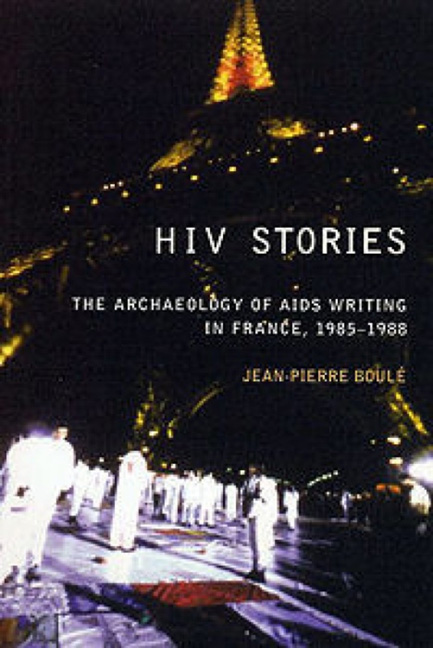2 - Juliette: Masculinist Desires and Sexualities
from Part I - AIDS Fiction
Summary
Pourquoi moi? is the first account by a woman of having contracted the HIV virus to be published in France. As I mentioned in the introduction, there is a possibility that a male author is masquerading behind the female voice, but there is no evidence to indicate this. Let us assume for a moment that the story may be an invention, as Mirko Grmek believes it is. This does not prevent it from carrying a level of significance since the story is presented as something that actually took place. The first-person narrator positions herself in relation to a particular set of discourses and their ensuing practices, and is also produced by these. She is also positioned by the framework of the back cover blurb. In addition, as Freeman reminds us, ‘[…] there is not all that much separating the interpretation of supposedly “true” stories from fictional ones’. In the absence of any evidence to the contrary, I will take Juliette, the first-person narrator, as representing a female voice.
The book's full title is Pourquoi moi? Confession d'une jeune femme d'aujourd'hui (Why me? Confession of a young woman of today). Juliette is both the pseudonym of the author and the name of the narrator. She receives an anonymous phone call on Christmas day, when she is nearly 29 (it must be Christmas 1985 since Juliette was born in 1957). The caller tells her that she, like the woman who is phoning her, is likely to die since they have both shared the same lover, ‘Pierre T.’, though the fact that he is dying of AIDS-related illnesses is only revealed on page 89. There follows a succession of flashbacks leading to Juliette's meeting with ‘Pierre T.’, interspersed with moments from her childhood and the occasional catching up of the story in 1985. The narrator looks at her childhood, her teenage years and her time at university. She then gives an insider's view of the political and journalistic worlds she enters. Starting at the bottom of the ladder, she quickly moves from being a provincial freelance to writing for a Parisian magazine.
- Type
- Chapter
- Information
- HIV StoriesThe Archaeology of AIDS Writing in France, 1985–1988, pp. 46 - 64Publisher: Liverpool University PressPrint publication year: 2002



